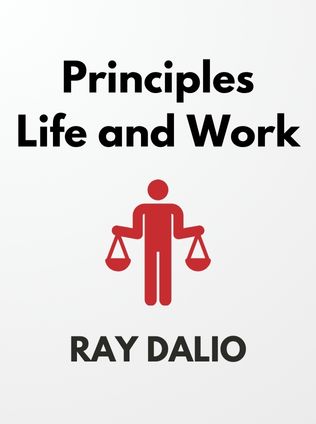
Principles: Life and Work
Life and Work
By Ray Dalio
Published 09/2017
About the Author
Ray Dalio is the founder, co-chairman, and co-chief investment officer of Bridgewater Associates, the largest hedge fund in the world. He grew up in a middle-class neighborhood in Long Island and began playing the stock market at age 12. He started Bridgewater out of his apartment in New York in 1975 and enjoyed some success before some erroneous market predictions caused him to lose everything in 1982. The experience taught him not to be overconfident, to gain a more complete view of economic history, and to find ways to balance low risk with high returns. This ultimately led him to develop a set of principles for living life and reaching goals, which he credits for his success. He wrote "Principles" so that others could benefit from what he’s learned.
Main Idea
"Principles: Life and Work" by Ray Dalio offers a comprehensive set of guidelines for decision-making and problem-solving, based on his experiences. Dalio emphasizes the importance of systematic thinking and developing fundamental truths to navigate various situations in life and work effectively.
Table of Contents
- Introduction
- Relentless Truth-Seeking
- Total Receptivity
- Extreme Honesty and Transparency
- Productive Conflict and Letting the Best Ideas Win
- Visualizing Complex Systems as Machines
- People Management
- Building Strong, Efficient Teams
- Effective Decision-Making
- Dalio’s Process for Achieving Success
Relentless Truth-Seeking
Dalio asserts that truth-seeking is crucial for effective decision-making. He advises embracing reality and being open to the possibility of being wrong. This principle is hindered by two main obstacles: the ego and blind spots.
Ego
Your ego is your underlying desire to be capable, loved, and praised. Experiences that threaten your ego can lead to denial and emotionally driven reactions. Dalio suggests a formula: Pain + Reflection = Progress. This encourages taking responsibility for mistakes and viewing them as opportunities for improvement.
"Pain + Reflection = Progress." - Ray Dalio
Ego Issues
- Resisting feedback at work because it threatens your self-image.
- Avoiding difficult conversations to protect your ego from feeling inadequate.
Blind Spots
Blind spots arise when you see the world through your own biased lenses. To overcome this, Dalio recommends being radically open-minded and receptive to other viewpoints.
"Your blind spots materialize when you see the world through your own biased lenses." - Ray Dalio
Blind Spots
- Ignoring a team member’s input because it conflicts with your own view.
- Failing to recognize your role in a project’s failure due to biased self-assessment.
Total Receptivity
Being totally receptive involves accepting that you might be wrong and actively seeking better answers. Dalio suggests three approaches:
- Looking for the best possible answer: Be open to others’ perspectives and insights.
- Recognizing that you’re blind: Even if you believe you’re right, be open to improving your viewpoint.
- Balancing humility with an awareness of what you know and how you reason: Be humble yet confident in your reasoning.
"Accept the possibility that others might see something better than you and point out threats and opportunities you don’t see." - Ray Dalio
Total Receptivity
- Seeking advice from colleagues with different expertise to enhance your project.
- Being open to criticism and using it to refine your strategies.
Extreme Honesty and Transparency
Dalio emphasizes that extreme honesty and transparency are key to effective decision-making. This involves not filtering your thoughts and allowing everyone access to complete information.
Extreme Honesty
Dalio advocates for speaking up and questioning relentlessly, creating a culture where everyone can call out issues immediately.
"Extreme honesty means not putting a filter on your thoughts." - Ray Dalio
Extreme Honesty
- Openly discussing project setbacks and finding collective solutions.
- Encouraging team members to provide candid feedback during reviews.
Extreme Transparency
Extreme transparency means sharing all relevant information with everyone in the organization, enabling better decision-making and trust.
"Extreme transparency means letting everyone see everything." - Ray Dalio
Extreme Transparency
- Sharing company financials with all employees to foster a sense of ownership.
- Providing access to meeting notes and decisions to ensure everyone is informed.
Productive Conflict and Letting the Best Ideas Win
Dalio believes that productive conflict and an idea meritocracy lead to better decisions. This involves being open to other viewpoints and weighing opinions based on credibility.
Sign up for FREE and get access to 1,400+ books summaries.
You May Also Like
The Subtle Art of Not Giving a F*ck
A Counterintuitive Approach to Living a Good Life
By Mark MansonRich Dad Poor Dad
What the Rich Teach Their Kids About Money - That the Poor and Middle Class Do Not!
By Robert T. KiyosakiHow To Win Friends and Influence People
The All-Time Classic Manual Of People Skills
By Dale CarnegieQuiet: The Power of Introverts
The Power of Introverts in a World That Can't Stop Talking
By Susan Cain



















